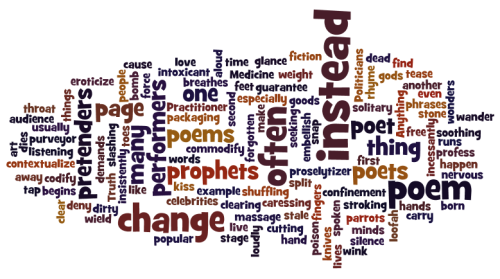“[Poetry is] like dancing, it doesn’t need to be taken care of as though it were sick.”
—Robert Pinsky
A few weeks back, the day job put on a great conference for librarians and publishers called Day of Dialog, and the Library Journal program included an insightful panel discussion called Poetry Opens Doors, with Jennifer Benka of The Academy of American Poets; Reggie Harris of Poets House; Miriam Tuliao of NYPL; Jill Bialosky of W.W. Norton; and former U.S. poet laureate, Robert Pinsky. (Check out the Storify for some tweets.)
Though it was put together and co-moderated by two of my favorite LJ colleagues, Barbara Hoffert and Annalisa Pesek, I was admittedly a bit skeptical about how it might play out, worried it would turn into a typically elitist discussion, far removed from most librarians’ day-to-day reality, so I was delighted when it turned out to be one of the highlights of the program.
Learning about Poets House’s intriguing “Poetry in the Branches” program, and hearing a far more open-minded approach from The Academy than when I worked there in the late 90s was great, but I was most intrigued by the discussion of poetry’s appeal, or lack thereof, and the obstacles that often get in its way. When the discussion turned to poetry programming in libraries, I was glad to see that a mention of poetry slams didn’t ruffle any feathers, a confirmation that the former “revolution” is now just another format to get poetry in front of a wider audience, especially kids and teens.
While many of the more popular initiatives noted tend to target April (National Poetry Month; Poem in Your Pocket Day), there also seemed to be an understanding that the best way to build an audience for poetry is by integrating it year-round, both in programming and in collections. A simple idea that applies to bookstores, too.
WHISPER WORDS OF WISDOM…
At one point in the discussion, Pinsky noted the flaw in how poetry is typically perceived and marketed (and, as a result, perceived), suggesting “it doesn’t need to be taken care of as though it were sick.”
Stressing that there are no rules when it comes to art, Pinsky says “a poem is not a challenge to say something smart…. A poem should not ‘mean’ but ‘be.’” And if you’re having trouble understanding it, “read it aloud.”
My first reaction to this — after nodding enthusiastically to the “read it aloud” suggestion, but before I fully grasped the overall context (via a Twitter conversation with another LJ colleague, Kate DiGirolomo) — came from the marketing side of my brain.
I’ve always been fascinated (and frustrated) by poetry’s “delicate snowflake” status, and how such a diverse variety of forms, styles, and voices often gets lumped into such a generic, cavernous category, like literary fiction and graphic novels. One of the things I’ve always loved about good anthologies and open mics is the inherent (or, at least, the potential for) diversity in those formats, something that’s not clearly communicated on bookstore shelves nor in the Dewey Decimal system.
When I took my marketing hat off and put my poetry hat on, the idea that a poem should just “be” became a compelling one because it’s so simple, so democratic, and so the opposite of how poetry is typically viewed. So liberating, too, as it happens to be how I’ve always approached poetry, but have always had a more convoluted explanation for it.
Whether it’s a poem by one of “the Masters,” a contemporary poet you’re unfamiliar with, or some kid reading on an open mic for the first time, let it be. Don’t over-think it, unless you’re compelled to, in which case, dig in.
And when you do find a poem you like, seek out more from that poet. Buy their books, attend their readings, and share their work with others!
EPILOGUE
It was not quite two months ago, but Poem in Your Pocket Day seems to have unexpectedly rekindled my own interest in poetry, a form I was pretty sure I was done with, faded to an influential but passing fancy that had served its purpose.
And it’s been a little over a month since I returned home to louderARTS, and that spark has grown into a warm flame, as I’ve written a few new poems, read on the open mic a few times, hit a couple of other readings, and have even begun to buy poetry books and literary journals/magazines again.
One of my favorite lines from one of my favorite movies (Magnolia) comes to mind: “We may be through with the past, but the past ain’t through with us.”
Do you like email?
Sign up here to get my bi-weekly "newsletter" and/or receive every new blog post delivered right to your inbox. (Burner emails are fine. I get it!)



Thanks for this report and for sharing your thinking about what came out of the event for you. Bravo that you are writing poems again – and stepping up to the mic. However poetry fits into the rest of your life, the work is terrific and I’m glad to hear your body of work is growing. It matters.
Thanks for the encouragement and support, Tina! Genuinely appreciated. 🙂